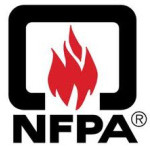- Industry: Fire safety
- Number of terms: 98780
- Number of blossaries: 0
- Company Profile:
Established in 1896, NFPA's mission is to reduce the worldwide burden of fire and other hazards on the quality of life by providing and advocating consensus codes and standards, research, training, and education.
The condition where air from below the smoke layer is pulled through the smoke layer into the smoke exhaust due to a high exhaust rate.
Industry:Fire safety
The condition where water flows from an atmospheric vented source to the pump without the average pressure at the pump inlet flange dropping below atmospheric pressure with the pump operating at 150 percent of its rated capacity.
Industry:Fire safety
The condition when an apparatus or component is not usable due to an unsafe or inoperable condition.
Industry:Fire safety
The condensed residue of suspended vapors and liquid products of incomplete combustion.
Industry:Fire safety
The conclusion of emergency service operations at the scene of an incident, usually the departure of the last unit from the scene.
Industry:Fire safety
The concentration to which it is believed that workers can be exposed continuously for a short period of time without suffering from irritation, chronic or irreversible tissue damage, or narcosis of a degree sufficient to increase the likelihood of accidental injury, impairment of self-rescue, or the material reduction of work efficiency, without exceeding the daily permissible exposure limit (PEL).
Industry:Fire safety
The concentration-time product (µL/L/min) obtained by the integration of the area under a concentration-time curve.
Industry:Fire safety
The concentration of oxidant below which a deflagration cannot occur.
Industry:Fire safety
The concentration of flammable constituents in air that exceed 25 percent of their flammability limit.
Industry:Fire safety
The compressor, blower, or compressed gas container that provides the protective gas at a positive pressure. The supply includes inlet (suction) pipes or ducts, pressure regulators, outlet pipes or ducts, and any supply valves not adjacent to the pressurized enclosure.
Industry:Fire safety
